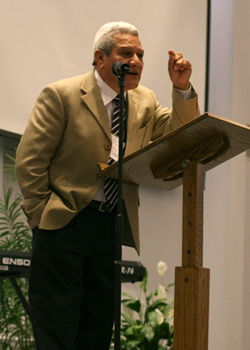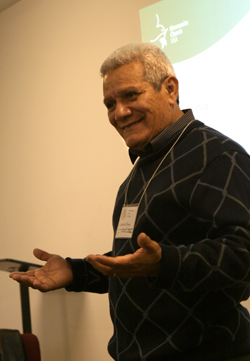 Tending the souls of conference ministers and tending the system of denominational ministry is the way Gilberto Flores sees his new role in Mennonite Church USA Executive Leadership.
Tending the souls of conference ministers and tending the system of denominational ministry is the way Gilberto Flores sees his new role in Mennonite Church USA Executive Leadership.
Flores is the director of Denominational Ministry and Missional Church for Mennonite Church USA Executive Leadership. He was formerly a denominational minister for Congregational and Ministerial Leadership and still heads the same office, although it underwent a name change in December.
With the new name comes a new structure that includes seven denominational ministers (up from four), who oversee relationships with the 21 area conferences of Mennonite Church USA. In addition to giving overall leadership for Denominational Ministry, Flores will also minister to the needs of five area conferences and their conference ministers.
“Gilberto brings pastoral instincts and missional theology and practice to his new role. He has earned respect as a leader and as a spokesperson for new initiatives of learning and witness,” says Jim Schrag, executive director for Mennonite Church USA. “Gilberto is multi-cultural in outlook, able to relate to and guide a wide variety of people within the church.”
The transition resulted from conversations with and prompting from conference ministers in 2007.
 “At the denominational level, we faced the need to recreate ourselves, including a name that suggests we are moving toward a better understanding of who we are. If we are called denominational ministers, then that is what we are,” Flores says. “Our intention is to function as the ears of the denomination, to be more care-giving in our leadership and to reflect a missional intention in our name.”
“At the denominational level, we faced the need to recreate ourselves, including a name that suggests we are moving toward a better understanding of who we are. If we are called denominational ministers, then that is what we are,” Flores says. “Our intention is to function as the ears of the denomination, to be more care-giving in our leadership and to reflect a missional intention in our name.”
The new name offers a more biblical vocabulary as well as a relational approach. The denominational ministers will expand the work that the Congregational and Ministerial Leadership office was doing in equipping congregational leaders for ministry and supporting conference ministers in their roles.
Herm Weaver from Nederland, Colo., began as conference minister for the newly formed Mountain States Mennonite Conference in August 2006.
“I work best when I am working with friends, when I’m in relationship with people I trust and who care about me,” Weaver says. “My sense is that this particular change puts denominational ministers in a position to be much more relational in our work together and in my mind that will bring the best out of all of us.”
Denominational ministers will be better able to engage with area conferences through closer, more frequent relationships and discern, for example, when conference leaders need pastoral care.
“If we do what we call ‘healthy relationship in healthy systems,’ we will have healthy congregations, healthy conferences and a healthy denomination,” Flores says. “This is the first step, and we’re working hard to facilitate ways to interact between all these levels.”
Flores sees God in control as he describes what he hopes will be an improved, two-way relationship between conference and denominational leaders.
“We gospelize in our approach, and, in the process, they gospelize us,” he says.
Three new denominational ministers have been appointed to work with Mennonite Church USA conferences: Phil Bergey will relate to North Central and Western District. Iris De León-Hartshorn will minister to Illinois and Ohio. Jorge Vallejos is the denominational minister for South Central.
Keith Harder, former director of Congregational and Ministerial Leadership, is currently a denominational minister for Central District, Indiana-Michigan and Lancaster Conference, in addition to leading denominational efforts for a healthcare plan for congregational church workers.
Other denominational ministers continuing on are Linford King, who works with Allegheny, Franklin, New York and Virginia conferences; and Lee Lever, whose area includes Atlantic Coast, Central Plains, Eastern District, and Gulf States. Flores is conference minister for the Franconia, Mountain States, Pacific Northwest, Pacific Southwest, and Southeast conferences.
“Denominational ministry that connects to conference ministry enhances congregational ministry. This is the vanguard of our churchwide missional thrust as we see God at work in hundreds of contexts across Mennonite Church USA and respond to God’s example through innovative, creative local leadership,” says Schrag.
photos by Timoyer
The opinions expressed in articles posted on Mosaic’s website are those of the author and may not reflect the official policy of Mosaic Conference. Mosaic is a large conference, crossing ethnicities, geographies, generations, theologies, and politics. Each person can only speak for themselves; no one can represent “the conference.” May God give us the grace to hear what the Spirit is speaking to us through people with whom we disagree and the humility and courage to love one another even when those disagreements can’t be bridged.
